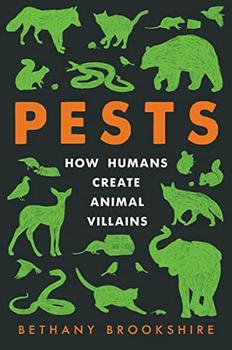Summary | Excerpt | Reviews | Beyond the Book | Readalikes | Genres & Themes | Author Bio

How Humans Create Animal Villains
by Bethany Brookshire
Trash piles up. Sewage spreads. Fences collapse. Holes and hiding places abound. Pests move in. "It's really interesting to me how [pests] take advantage of the ways that different groups of humans have treated each other very poorly," Biehler says.
When pests move into these habitats full of delicious opportunities, it's the people who get the blame. The animals become a symbol of the "sins" of the people living with them. People in better circumstances see laziness, crime, and pests, where the effects of racism, lack of opportunity, or simple poverty truly reside. When we dehumanize each other, we even use words associated with pests. The Nazis compared Jews not just to animals, but to rats. People kept in oppressed conditions are compared to vermin, and suffering from the depredations of those vermin is a by-product of their oppression.
We fail to manage pests in all sorts of ways. But sometimes the reason we fail is because we also fail to stand up for each other. Human areas become infested because we haven't given everyone the dignity of clean, well-built, vermin-free homes. We don't want to spend the money to put systems in place to help people fight off animals they cannot control themselves. Another species succeeds because our social contracts have failed.
Humans and wildlife will only continue to run into each other as we expand out over the planet. As we take up more and more land and turn it into subdivisions, strip malls, and farms, there will be less space for the animals that once lived there. Squeezed into our parks and our backyards, their choice is to adjust or die.
When they die, we wring our hands. We mourn the loss of mountain lions, eagles, and pandas. We set up conservation schemes and celebrate any small success. We even keep track of their sex lives. When zoos closed during the COVID-19 pandemic in 2020, two pandas living in Hong Kong finally had sex—and people around the world shared the puerile panda pics.
But when animals adapt well (and maybe occasion fewer accidentally racy photo shoots), we don't seem to be so thrilled. What about when a raccoon learns a disused chimney is a warm place to raise a family, when a black bear learns that campsites mean food, and when an elephant realizes the fields outside a national park are there for the taking?
In theory, we wanted these animals to live. We just didn't want them to live here.
TO MURDER SHAKESPEARE: Some are born pests, some achieve pestdom, and some have "pest" thrust upon 'em. But these are labels that we project onto these animals. Pests—the mice, raccoons, and seagulls of the world—are not irritating by nature. Instead, they are animal winners on a planet full of loss. When your habitat is full of parking lots, brick apartment buildings, and carefully tended gardens, survival isn't about staying sweetly in the woods and meadows. Instead, evolutionary success looks a lot like raiding our trash, nesting on our buildings, and eating our gardens down to nubs.
My friends take pictures of squirrels and send them to my group chats. My neighbors catch F***ing Kevin in the act. It makes us all smile. It's a funny, lighthearted mockery of my own failure. My personal squirrel menace is a symbol of my inability to put up nets or cover my plants, to create a less squirrel-friendly environment. Maybe he's a symbol of my failure to grow a garden at all.
But if I change the frame of this story, Kevin is something else. He's a story of success. I've created an environment that is perfect for Kevin. There's birdseed. Big trees for a squirrel to nest in. There are plenty of tomatoes. And, unless you count the cars, there are very few predators to trouble him.
Is it any wonder that Kevin wanted in?
F**KING KEVIN, MUCH as I hate him, has inspired me. He's made me wonder: Why does someone like me—someone raised predominantly in a Westernized society, living an urban and suburban lifestyle, someone who feels herself to be educated and open-minded, and who loves the environment so much—see some animals as pests and others as not?
Excerpted from Pests by Bethany Brookshire. Copyright © 2022 by Bethany Brookshire. Excerpted by permission of Ecco. All rights reserved. No part of this excerpt may be reproduced or reprinted without permission in writing from the publisher.
Your guide toexceptional books
BookBrowse seeks out and recommends the best in contemporary fiction and nonfiction—books that not only engage and entertain but also deepen our understanding of ourselves and the world around us.